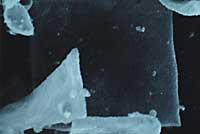Square bacteria
After 24 years since its discovery, researchers have made square bacteria grow in the laboratory. This peculiar bacterium was first seen in 1980 by a microbiologist, Anthony Walsby. He found it in a hypersaline well near the Red Sea, completely square and flat, of 0.15 microns per side.

Since then many microbiologists have tried to grow square bacteria in the laboratory to study them. But so far they have not managed to do so. Finally, the effort of two independent teams has yielded good results.
For this they have had to guess what is the ideal medium, among which is the minimum salt concentration of 18%. It has also been necessary to have a lot of patience, since this bacteria takes a lot to reproduce: The bacterium Escherichia coli takes 20 minutes to bend, which is equivalent to one or two days.
Now taxonyms try to guess the name. Some have proposed Haloquadratum walsby in honor of what he saw for the first time. On the other hand, it has been detected that it is also able to grow in areas with high magnesium chloride content, so some researchers believe that it is a good example to study the possible life in different places of the solar system, such as the moons Europe and Ganymedes of Jupiter.





